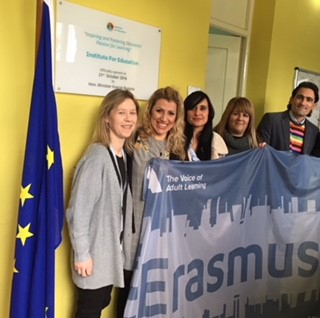In February 2018 Lindsey Liston, from the Family Resource Centre Southill Limerick travelled to Malta to meet key policy-makers involved in devising the free childcare scheme at the Ministry for Education and Employment in Malta. The trip took place as part of an ERASMUS+ project organised by AONTAS to support the professional development of adult education practitioners.

Lindsey Liston from Southill Limerick, works with the Family Resource Centre (FRC) and has been involved with community education groups in Limerick city for the past 10 years. In February 2018 Lindsey took part in the ERASMUS+ ‘Making an Impact at European Level’ project, an EU-funded project, organised by AONTAS, that supports the professional development of adult education workers.
As part of this project Lindsey travelled to the Ministry for Education and Employment in Malta to meet with key policy-makers involved in devising the free childcare scheme with the aim of helping to support the work of Southill FRC.
The purpose of the visit was to exchange knowledge and learning, particularly in the areas of literacy and numeracy interventions, parental involvement in education, early school leaving and the free childcare scheme introduced by the Maltese Government in 2014.
Opening Doors through Literacy
I was thrilled to meet Christianne Fenech and her colleagues at the Ministry of Education and Employment on day one. I was treated to a jam-packed agenda which introduced me to various aspects of Malta’s education system from the ‘cradle to the grave’ in just a few short days.
At the National Literacy Agency, I met with a number of senior staff. I learned about all of the creative and innovative interventions for supporting and enhancing literacy and numeracy through training, supports and programmes being run in early-years settings, schools and the wider communities.
I noticed that awards and rewards are given to children who are seen reading at the park or in town etc. The agency publishes bookmarks to promote reading “anytime, anywhere.” They also organise various events and have an impressive range of programmes and initiatives being developed and delivered from summer reading programmes, to family writing activities some of which Ireland could use in order to build and expand upon our own impressive range of literacy initiatives.
Free Childcare - ‘Making Work Pay’
From an Irish perspective, perhaps one of the most interesting initiatives showcased throughout the exchange was the free childcare scheme introduced by the Maltese Government in 2014. The basic elements of the scheme are that all parents who are in employment or who are pursuing their education, receive Free State sponsored childcare to enable them to pursue this.
The scheme has proven highly successful with employment rates in Malta returning to full levels. The increase in tax revenue due to increased rates of employment and the decrease in social welfare dependency has resulted in the scheme effectively paying for itself. The draw back to the scheme is that it inadvertently denies those children, who perhaps need early intervention the most, because their parents may be unemployed and/or are unable to pursue education at the present time.
This is where Malta and Ireland can learn from each other. In Ireland we have mastered how to support those children most in need of services through subsidised provision but have perhaps neglected to ‘make work pay’ with no effective childcare supports for working parents. The two approaches combined from both countries has the potential to address the weakness in both systems while providing effective, low cost, high quality childcare for all but exploring that in more detail is another blog in itself!
Learning from the Trip
Overall the trip was really productive and a worthwhile learning experience. The learning I gained from the experience will both enhance and inform my current and future work in Southill FRC. It has also opened doors for future cross-country collaboration between our two countries but perhaps the biggest advantage of participating in the ERASMUS + programme was the opportunity to identity and be reminded of what we are excelling at as well as how we can improve here in our own country.
In Ireland, as in most European countries, we have a tendency to focus on the things that we are not getting right or the areas that we are not doing so well in and in the process lose sight of what we are doing well. This trip provided a timely opportunity to be reminded of that and to discuss our successes, our achievements and our advancements, in particular in the area of numeracy and literacy, parental involvement in education, early intervention and prevention and inequality.